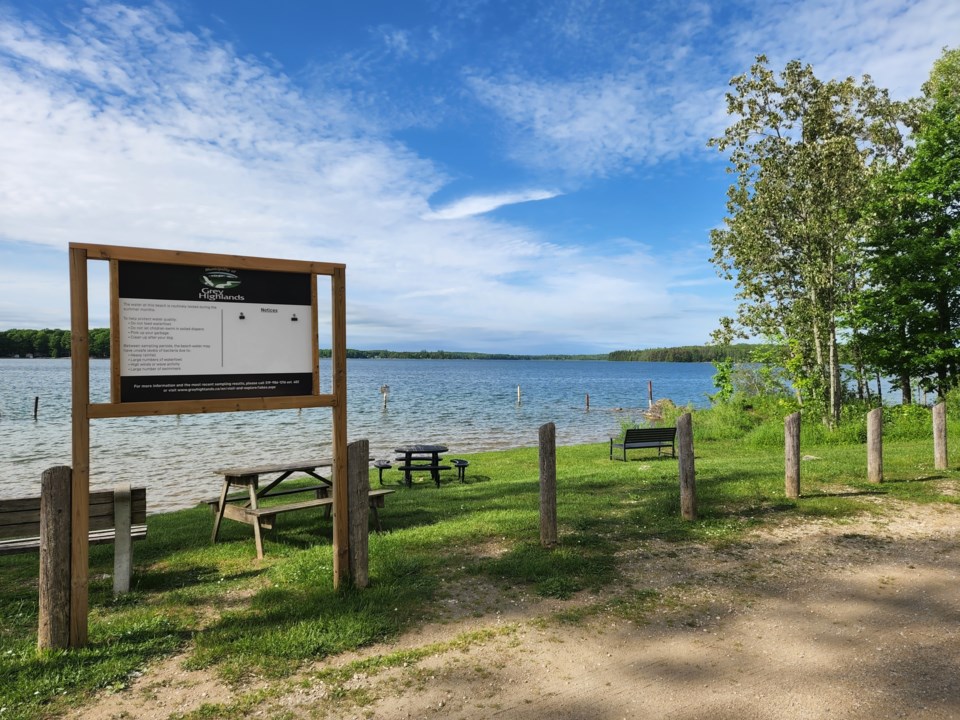Grey Highlands council has narrowly approved a controversial campground proposed for a property on the shores of Lake Eugenia.
At its meeting on March 20, council considered a staff report that recommended approval of a rezoning to allow a campground, with ten cabins on a 39.1 hectare property that is located on 12th Concession B. The proposal, called Gandhi Cabins, generated significant public opposition at a public meeting held on the matter recently. Concerns expressed included: noise, traffic, impact on the lake and an increase in boat traffic.
Council was divided on the matter, with the approval of the rezoning passing in a 4-3 vote. Mayor Paul McQueen, Deputy Mayor Dane Nielsen and councillors Joel Loughead and Tom Allwood combined to approve the application.
The property is currently zoned as restricted agriculture, hazard and wetland. Council’s approval of the application will rezone a portion of the restricted agriculture and hazard to rural with an exception for the cottage building envelopes. The recommendation from planning staff to approve the application generated significant discussion around the council table.
McQueen asked if the municipality could implement a measure to ensure that only non-motorized boats were launched onto the lake from the property.
Matt Rapke, manager of planning, said such a prohibition would not be appropriate in a zoning bylaw amendment. Rapke explained that the shoreline of Lake Eugenia is owned by Ontario Power Generation (OPG), which would mean the municipality would be trying to regulate an activity on OPG-owned land.
“It would not really be enforceable. Launching a boat, in itself, isn’t a use. It’s just a thing you do,” said Rapke.
Coun. Nadia Dubyk asked Rapke about comments raised by Grey County’s planning department about the proposal. One of the county’s comments expressed concerns about the sewage flow to the proposed septic system that would service the cabins. The campground projects that the flow would be 9,900 litres per day, which is just under the 10,000 litre threshold that requires extra permits from the Ministry of Environment, Conservation and Parks.
Rapke said he felt the proponent’s studies in the application had addressed the county’s concerns. He said if the sewage flows did exceed 10,000 litres per day, the proponent would have to get additional permission from the province to proceed.
“I do believe it’s going to be under – based on the assessment of their engineer,” he said.
Coun. Paul Allen, who chairs the planning portion of council meetings, surrendered the gavel during the discussion in order to express his opposition to the proposal.
“When is it too much for people to put up with?” Allen asked. “People do have some rights to be able to enjoy their properties. It’s getting harder and harder to do that.”
On the other hand, McQueen said the municipality is trying to encourage economic development in the community and the proposed campground was an opportunity for growth and to add accommodations to the local area.
“It’s a large piece of land. It has the ability to accommodate,” said McQueen.
Coun. Dan Wickens disagreed.
“Is it worth putting more pressure on the lake? I can’t support this,” he said.
The rezoning does include several conditions.
They are:
- The proposed cabins are seasonal accommodations and can be operated only from March until December each year.
- A holding provision will be placed on the property until a study is completed that shows a driveway – which must be approved by the conservation authority – can be constructed from the road to the cabin site.
- Also, an environmental impact study must be completed on campground lands within 120 metres of wetlands on the property.
